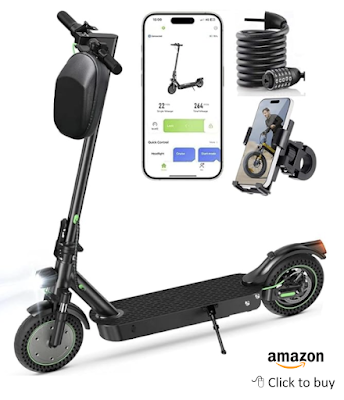Visit any city or large town and you're bound to see people whizzing around, going about their business on e-scooters (aff. link).
There are now more than a million of these nippy little machines used on the streets of the United Kingdom, of which more than three-quarters are privately owned. There are around two-dozen e-scooter trials operating across the nation, that allow members of the public to hire e-scooters for convenient, green transportation in their locality.
According to the latest Government data, there were almost 1,300 collisions in Great Britain (so England, Scotland and Wales) involving e-scooters in the 12 months leading up to June 2023. These resulted in the deaths of 7 e-scooter riders and the serious injury of 316 more. They also led to the serious injury of 50 pedestrians and 17 pedal cyclists.
With the number of e-scooters set to double by the end of 2025, it is important that e-scooter riders understand their legal obligations. The rules are different depending on whether a person is riding a privately owned e-scooter, or one hired via an official trial scheme.
The first important thing to note is that e-scooters are considered as motor vehicles under the Road Traffic Act 1988. That means they can only be used on a road or other public place if the rider is correctly licensed and insured. We do get people before the court accused of committing e-scooter offences.
Privately owned e-scooters:
As things currently stand, it is not possible to obtain motor insurance for a privately owned e-scooter. That being the case, it is currently illegal to ride an e-scooter on a road or other public place. The police have the power to seize uninsured e-scooters under section 165 of the Road Traffic Act 1988.
It is, however, legal to ride a privately owned e-scooter in a private place with the landowner's permission.
Given the legislation, you might be wondering why so many privately owned e-scooters are seen riding around in public. It's a bit of a floodgates issue - if the police were to crack down hard on private e-scooters then they would quickly be overwhelmed by the sheer volume of them. That being the case, the rider of a privately owned e-scooter is only likely to be bothered by the police if they are involved in a collision or flagrantly disregard the rules of the road.
Trial scheme e-scooters:
Trial scheme e-scooters, like those shown in the image above, are insured by the scheme organiser. That being the case, anyone hiring a trial scheme scooter can ride it on a road or other public place. They should not be used on the public pavement.
Anyone hiring a trial scheme e-scooter needs to hold the correct driving licence (category Q or P/M) and meet any other conditions the scheme organiser might impose, otherwise it will invalidate their insurance.
If these e-scooters are used on a road or other public place then all the normal rules of the road apply. That means the user:
- Must obey all traffic signs and signals;
- Must not be unfit or over the prescribed limit for alcohol or drugs;
- Must have a valid licence (e.g. not be disqualified);
- Must stop when required to do so by a constable in uniform or traffic officer;
- Must provide their driving licence when required to do so by a constable in uniform.
There is currently no legal requirement for anyone riding an e-scooter to wear a helmet (aff. link).


No comments:
Post a Comment